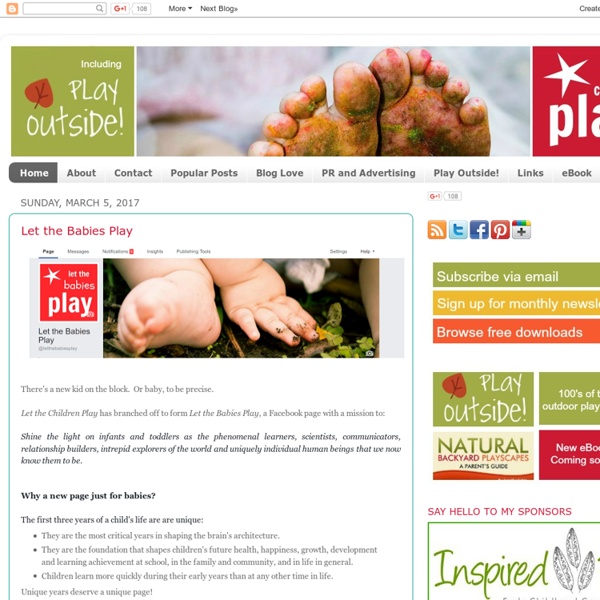



Ms. Conway's Kindergarten Website: About Play-Based Learning It has long been known that there is a strong link between play and learning. Children are full of natural curiosity and they explore this curiosity through play. When kids are playing, it's the perfect time to learn. Play teaches kids how to problem solve, how to make friends, how to express themselves, how to enjoy the world around them, and how to recognize letters and numbers. All of these skills form the foundation of a love of learning. In the kindergarten program, teachers structure play to create learning moments. Both child-initiated free play and more structured play-based learning opportunities are integral parts of the early learning classroom. As children move naturally from noticing and wondering about the objects and events around them to exploring, observing, and questioning in a more focused way, the teacher helps them develop and extend their inquiry process.
Irresistible Ideas for play based learning The Mud Kitchen - A Recipe for marvellous Outdoor play Hello lovely blog visitors. Welcome! I am sharing the newest edition to Dimples out door play area today. The awesome and totally messy mud kitchen. The best recipe for engaging children in messy, active, outdoor learning is with mud. Here is the DIY mud kitchen that we built for Dimples in a few hours using recycled materials. The mud kitchen is built from off cuts of wood that I painted with chalk board paint, they're butted in to a old sink that came from a wrecked caravan, you could grab one from the wreckers or the buy back at the tip. Nearby I have up cycled an old sand pit as a mud pit. How awesome, an endless supply of mud on hand for hours and hours of messy outdoor play. For more outdoor play ideas you may like Happy Outdoor Adventures.
joran Play: Where Learning Begins! Browse this selection of articles on play based learning from Young Children and Teaching Young Children. Assessing and Scaffolding Make Believe Play: Mature make-believe play provides unique learning opportunities Read more » Chopsticks and Counting Chips: Play and foundational skills don’t need to compete for the teacher's attention Read more » Playdough - What's Standard about It?: Using playdough to address early learning standards Read more » Block Building and Make-Believe for Every Child: Encouraging boys and girls to try out the learning centers they don’t usually visit Read more » Block Off Time for Learning: When children play with blocks, they learn math, literacy, social skills and so much more Read more» Recess—It’s Indispensable: Test scores do not improve when recess is cut Read more » Why Do Babies Like Boxes Best?
Home - Healthy Spaces & Places Download: for all practitioners and decision makers who are working within the built and natural environment, who can help tackle some of Australia’s major preventable health issues by – walking, cycling and using public transport – every day. But it’s also for everyone who can make a difference to the overall health and wellbeing of Australians – design professionals, health professionals, the property development industry, governments and the community. Healthy Spaces and Places supports and complements planning and design initiatives throughout Australia. It is a single source of easy-to-find, practical information from experts in health, planning, urban design, community safety and transport planning. This website includes:
Families and Teachers as Partners / Browse Our Publications / Publications & Resources This Early Childhood Digest, produced by the National Institute on Early Childhood Development and Education of the Office of Educational Research and Development in the U.S. Department of Education, is based on Harvard Family Research Project (HFRP) materials, New Skills for New Schools. About This Series These one-page digests focus on ways that families and schools can work together to help young children learn and grow. Children, families, and schools all benefit when families and teachers work together. What Can Families Do to Work Better With Schools? What is my relationship like with my young child's teacher or caregiver? How Can Teachers and Families Work Together? About families—who they are and what they want for their young child. Research on how teachers learn to work with families shows good examples of families and teachers as partners and the important role that families play. Free.
After Effects region of interest After Effects CC 2015 (13.5) is now available. For details about what’s new and changed in After Effects CC 2015 (13.5), see this page. IMPORTANT: Before installing the new version of After Effects, please read this page about the default behavior of the updater, which is to remove all previous versions of the application, and this page about why you might not want to do that. The biggest piece of work for After Effects CC 2015 (13.5) has been a complete re-architecture of how rendering occurs, specifically regarding separating the main render thread from the thread that controls the user interface. Please, check with the vendors of your third-party plug-ins for updates that are compatible with After Effects CC 2015 (13.5). I said that most are ready. As usual, Toolfarm is doing an excellent job of tracking which plug-ins have updates, and where to get them. Trapcode Sound Keys (Red Giant) This bug is our fault, not the fault of Trapcode or Red Giant. other Red Giant plug-ins Boris FX